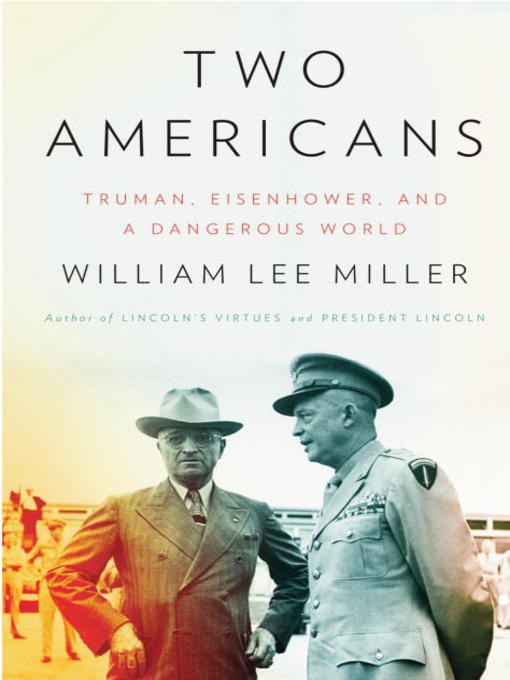
Two Americans
Truman, Eisenhower, and a Dangerous World
کتاب های مرتبط
- اطلاعات
- نقد و بررسی
- دیدگاه کاربران
نقد و بررسی

March 1, 2012
A comparison of the origins and careers of two presidents from the middle of the 20th century. Presidents Truman and Eisenhower were both past 50 when each was catapulted to fame and power after decades of diligent but largely unnoticed public service. They came from conservative small-town roots--Truman from Missouri forebears with strong Confederate sympathies, Eisenhower from pacifist Mennonite ancestry. Truman, however, was a lifelong partisan Democrat; Eisenhower had been trained as part of the officer class to look down on politicians and had no affiliation with a political party until shortly before running for president. Truman relished the president's role as a partisan political leader, while Eisenhower emphasized that of an apparently apolitical head of state. Regrettably, the 1952 campaign poisoned the earlier cooperative relationship between the two men, as exemplified by Eisenhower's childish snubs on the day of his inauguration. They came to power when the United States was adjusting to the breakup of the alliance that won World War II and formulating the Cold War policy of containment. The development of the hydrogen bomb by both the U.S. and the Soviet Union led to a balance of terror that avoided another all-out war at the price of keeping the world on the edge of nuclear annihilation. Distinguished historian Miller (President Lincoln: The Duty of a Statesman, 2008, etc.) offers lively, well-presented parallel biographies, though the book is superficial in comparison with recent exhaustive works on each man. The author is primarily interested in comparing the experiences of these two men as they rose through the ranks of their chosen professions, and their approaches to government as exemplified by several specific issues: McCarthyism, in which neither president distinguished himself; civil rights, in which Miller finds Eisenhower severely wanting despite his use of troops in Little Rock; and their attitudes toward the possible use of tactical and strategic nuclear weapons. Nothing groundbreaking, but entertaining reading for presidential-history buffs.
COPYRIGHT(2012) Kirkus Reviews, ALL RIGHTS RESERVED.

Starred review from April 15, 2012
Dual biographies of U.S. presidents are not unusual for the Founding Fathers, but are rarer thereafter. Miller (ethics and institutions, Miller Ctr., Univ. of Virginia; Lincoln's Virtues) has a deep understanding of the office of the presidency and its holders. His main thesis here is that the common Midwestern heritage of the Missourian, Truman, and the Kansan, Eisenhower, shaped their careers and worldviews. Eisenhower was a low-ranking officer for years until he came to the attention of George Marshall in World War II. Meanwhile, Truman was a relatively unimpressive but hardworking senator who gained a reputation for rooting out corruption on the home front. Miller provides numerous examples of how each man's life and career mirrored the other's as they rose to national and international prominence. Although the 1952 election, which resulted in Eisenhower's succeeding Truman in office, soured their relations, over time they regained mutual respect. The presidency, after all, is a small club, whose members understand each other at a level unknown to the rest of us. VERDICT Miller's examination compares favorably with Steve Neal's Harry and Ike: The Partnership That Remade the Postwar World. This exceptionally well-written book is recommended for both general and scholarly audiences. [See Prepub Alert, 9/29/11.]--Ed Goedeken, Iowa State Univ. Lib., Ames
Copyright 2012 Library Journal, LLC Used with permission.

























دیدگاه کاربران